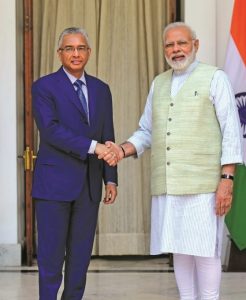In this article, we will discuss about...
Introduction
In the vast landscape of international trade and investment, Double Taxation Avoidance Agreements (DTAA) serve as pivotal instruments in promoting economic cooperation and eliminating the adverse effects of double taxation. Within this framework, the DTAA between India and Mauritius has played a crucial role in facilitating bilateral trade and encouraging foreign investment between the two nations.
Historical Background
To understand the significance of the DTAA between India and Mauritius, we must delve into the historical context of their economic relations. Dating back to the 18th century, when the islands of Mauritius were under Dutch and French colonial rule, the region witnessed the gradual development of commercial ties with various countries, including India. The emergence of the sugar industry in Mauritius and India’s growing economic prowess led to a natural convergence of interests.

The Need for DTAA
The primary motivation behind establishing the DTAA between India and Mauritius was twofold. Firstly, it aimed to address the issue of tax evasion and avoidance by establishing clear guidelines and mechanisms for sharing tax-related information. Secondly, it sought to promote foreign investment by providing a favorable tax environment and mitigating the risks associated with double taxation.
Consult CA Arun Tiwari for more info at 📞 8080088288 or cs@aktassociates.com
Key Features of the DTAA
The DTAA between India and Mauritius encompasses a wide range of provisions designed to facilitate cross-border transactions and eliminate barriers to investment. It defines the tax residency of individuals and companies, outlines the principles of double taxation relief, and delineates the rules for capital gains taxation. Moreover, it provides guidelines for the taxation of dividends, interest, and royalties, ensuring a fair and transparent framework for both nations.
 Impact on Investment and Trade
Impact on Investment and Trade
Since the implementation of the DTAA, there has been a significant boost in foreign direct investment (FDI) flows from Mauritius to India. The favorable tax regime established by the agreement has instilled confidence in investors, leading to increased capital inflows and stimulating economic growth in both countries. Additionally, the DTAA has facilitated bilateral trade by removing tax-related impediments, allowing businesses to operate more efficiently and competitively.
Challenges and Controversies
Despite its overall positive impact, the DTAA between India and Mauritius has faced its fair share of challenges and controversies. One of the main concerns has been the issue of round-tripping, whereby funds originating from countries other than Mauritius are routed through the island nation to take advantage of the favorable tax provisions. This has raised questions about the effectiveness of the agreement and the potential for misuse.
Case Studies
To assess the practical implications of the DTAA, it is instructive to examine specific case studies. In recent years, there has been a substantial increase in investment flow from Mauritius to India, particularly in sectors such as real estate, infrastructure, and technology. Indian businesses have also benefited from the DTAA, with improved access to capital and increased opportunities for expansion.
Recent Developments
Recognizing the need to adapt to changing dynamics, both India and Mauritius have revisited the DTAA to address emerging challenges and align the agreement with evolving global tax norms. Recent revisions have focused on strengthening provisions related to tax residency, capital gains taxation, and the exchange of tax-related information. These changes reflect the commitment of both nations to maintain a robust and relevant framework for bilateral economic cooperation.
Comparison with Other DTAA
To gain a comprehensive understanding of the India-Mauritius DTAA, it is instructive to compare its provisions with those of other countries. By contrasting the various agreements, policymakers can identify best practices, learn from different approaches, and explore avenues for further improvement.
Conclusion
In conclusion, the DTAA between India and Mauritius has emerged as a cornerstone of their economic relationship. By addressing issues of double taxation and providing a conducive environment for investment and trade, the agreement has facilitated economic growth and strengthened bilateral ties. However, ongoing revisions and the changing landscape of international taxation necessitate continuous evaluation and adaptation to ensure the long-term effectiveness of this essential agreement. With a shared commitment to fostering economic cooperation, India and Mauritius can look forward to a future of mutual prosperity.


